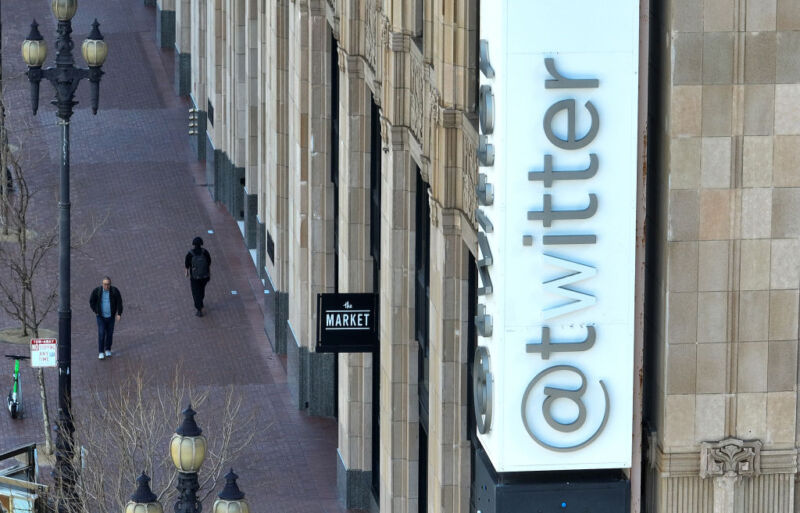
Last month, Twitter CEO Elon Musk told employees that they’d be eligible to receive stocks in X Corporation—the new name for the holding company that he initially set up to purchase Twitter—telling them that soon Twitter could be worth $250 billion. More recently, an April court filing shows that Twitter, Inc. has officially merged with X Corp, achieving Musk’s goal of wiping out Twitter Inc. as a company. The court filing confirmed that Twitter, Inc. “no longer exists.” Now, there is only X Corp.
“X,” Musk cryptically tweeted after the news of the merger broke.
Musk's lawyer, Jonathan Patchen, didn't immediately respond to Ars' request for comment.
This tweet so far is his only public announcement regarding this change. It remains unclear what the change ultimately means. Some speculate that Twitter becoming X Corp is the next step in Musk’s plan to launch an “everything app” like China’s WeChat, where users can send payments, shop, and message each other all on one platform. Successfully launching an "everything app" would seemingly be one way for Musk to achieve his ambitious $250 billion valuation goal. But, as Slate noted, others have suggested that merging Twitter, Inc. into X Corp could also signal that Musk was serious when he tweeted that it was a “good idea” to fold all his companies—Twitter, SpaceX, Tesla, Neuralink, and The Boring Company—into one parent company called X.
As usual, it’s hard to predict what Musk intends to do next with Twitter. This news follows one of the most unserious months in Musk’s tenure as CEO, where he replaced the Twitter bird logo with Dogecoin’s shiba inu logo and got in trouble with the landlord at Twitter’s headquarters when he erased the “w” on Twitter’s signage so that the building was marked “Titter.” Journalist Dave Troy tweeted that these moves and others—like Twitter's press team responding only with a poop emoji—were apparently signs that Musk was about to “kill off a beloved (?) global brand.”
Anyway, if you’re about to kill off a beloved (?) global brand, you might screw around with the logos and signage and replace it with meme dogs and scatological humor. 🤷♂️
— Dave Troy (@davetroy) April 11, 2023
Troy’s thread also noted that Twitter co-founder Jack Dorsey had praised Musk as the only appropriate buyer for Twitter. Dorsey tweeted in April 2022 that Musk was the “singular solution” Dorsey trusted to solve “the problem” of Twitter being a company, rather than a public good, saying “I don’t believe anyone should own or run Twitter.”
There are no signs yet that Musk plans to relinquish control of Twitter, though. Most recently, Musk wielded his power of Twitter and stirred controversy by invalidating media organizations he seemingly disagrees with, removing The New York Times verification badge and labeling NPR as “state-affiliated media.” Musk also, in a seemingly anti-competitive move, blocked some tweets linking to Substack after Substack launched a potential Twitter rival called Substack Notes.
X Corp fits into Musk’s “everything app” plans
The similarities between Twitter and Substack Notes are obvious to more than just Musk—The Verge reported the Substack news by joking that “Substack is getting tweets.” And Musk’s personal affront to Substack seemed to be confirmed when journalist Matt Taibbi tweeted to complain that he could no longer link to his Substack on Twitter. The Twitter Files journalist, formerly tight with Twitter, confirmed that the links to Substack stopped functioning due to Twitter raising a “dispute over the new Substack Notes platform.” When Taibbi asked Twitter how he was supposed to promote his Substack, Twitter’s response suggested that he post all his articles “on Twitter instead.”
Part of Musk’s “everything app” strategy is to entice creators like Taibbi to live on Twitter, with Musk envisioning Twitter users becoming avid subscribers eager to access exclusive content from journalists posting entire news articles or other creators posting long videos. Other ways he plans to monetize Twitter include creating a digital payments platform and essentially an online bank, where creators like Taibbi could earn higher interest by keeping their money on Twitter. Experts told American Banker that Musk might struggle with his payments platform ambitions, facing “a crowded market that is rarely friendly to payment products from social networks.”
In the past, Musk has said that he thinks he could transform Twitter into X, the “everything app,” within the next five years. Experts told Ars that regulators would likely get in Musk’s way, with lawmakers recently scrutinizing tech companies much more closely over antitrust concerns and security concerns regarding rapid developments with fintech. But if Musk can stay ahead of regulators, he might possibly be able to forge a path to turn Twitter into an “everything app,” potentially called X, worth $250 billion.
With the recent court filing and Musk’s email to employees signaling his plans to quickly balloon Twitter’s valuation, the clues are there that Musk has not given up on this dream. And it must be personally satisfying for Musk to merge a well-known brand like Twitter with X Corp and have that merger result in X Corp as the chosen name for the resulting company. Back in the early 2000s when Musk’s online bank X merged with PayPal, leadership decided to keep the name PayPal due to its broader brand recognition after Musk lost a popular vote. Now, Musk’s vote is likely the only one that counts, and thus Twitter, Inc. has now become X Corp. This move could perhaps help to distance X Corp from all of Twitter's legal woes—including most recently a lawsuit filed by Twitter's ex-CEO.
reader comments
372